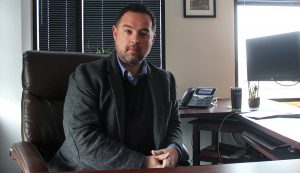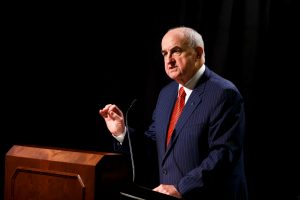Subscriber Benefit
As a subscriber you can listen to articles at work, in the car, or while you work out. Subscribe NowThe Indiana University Board of Trustees violated the Indiana Open Door Law last spring when it approved a contract for more than $500,000 for former university President Michael McRobbie, outside of a public meeting, for consulting services after his retirement, according to the Indiana public access counselor.
In a nine-page advisory opinion issued Monday, Indiana Public Access Counselor Luke Britt agreed with the complaint filed by Steve Sanders, who is a tenured IU Maurer School of Law professor.

Britt, determining the complaint wasn’t time-barred, opined that then-board chair Mike Mirro shouldn’t have had the delegated authority to make the final decision and concluded the McRobbie contract had enough interest that it should’ve been discussed in a public meeting.
“… (D)espite IU’s casualness regarding high-dollar contracts, a contract extension or consulting agreement worth over $500,000 to a single employee is undoubtedly an action item that would need authorization via final action and warrant discussion in an open meeting,” Britt wrote. “The particulars then may be worked out with the delegate. IU’s argument that the agreement was not an extension but rather a whole new ‘consulting’ contract only exacerbates the matter.”
When asked for comment on the advisory opinion on Monday, IU Spokesman Chuck Carney told Indiana Lawyer the board had already taken care of the issue.
“Out of an abundance of caution, we addressed the matters of concern in the public access counselor’s ruling during the December board of trustees meeting and we consider this matter closed,” Carney said in an email.
McRobbie’s additional payments and the complaint

The IU Board of Trustees negotiated an addendum to the employment contract for McRobbie in March 2021. Initially, the addendum was to operate as a six-month extension to McRobbie’s term as president while the board searched for his replacement.
However, on April 16, IU named Whitten as its new president.
Despite hiring Whitten, on May 13, Mirro and trustee Vice Chair Patrick Shoulders signed a letter to McRobbie agreeing to pay him because he had delayed his sabbatical plans.
Around the same time, Sanders filed public records requests with the university regarding McRobbie’s contract, among other items.

Sanders received the documents he requested pursuant to his request in August, which led to his speculation that a new agreement with McRobbie was done in secret throughout 2021, according to the advisory opinion.
“[Sanders’] suspicions were confirmed when the agreement was ratified at a meeting on October 8, 2021,” Britt wrote.
On Oct. 7, IU confirmed with Indiana Lawyer and the Indianapolis Business Journal that the trustees had agreed to pay McRobbie an additional $582,722, an amount that included salary and deferred compensation.
At the time, Carney said the board had approved the additional pay at its August meeting.
“As is standard procedure, personnel decisions involving contracts are discussed in executive session, if they are discussed at all, and … voted in the administrative action section of the [public] meeting,” Carney wrote in an October email.
After the IL and IBJ story published on Oct. 8, Sanders filed another complaint to Britt — this time alleging the board of trustees violated the Open Door Law by failing to take final action on McRobbie’s extension in a public meeting.
Sanders contended that under the Open Door Law, the consulting agreement with McRobbie should’ve been publicly reviewed and acted on at the trustees’ June meeting because it was set to take effect at the beginning of July.
In a formal response in November, then-IU vice president and general counsel Jacqueline “Jackie” Simmons argued Sanders’ complaint was time-barred under Indiana Code § 5-13-7, that Mirro acted within the authority delegated to him by the full board and that the board was not required to discuss and vote on the consulting letter at a public meeting. Additionally, Simmons made multiple accusatory statements toward Sanders, including that he wasn’t acting in the public interest but for his own benefit.
Despite claiming they followed procedures, the board held a voice vote on approving McRobbie’s contract on Dec. 3. On Dec. 2, Carney told IBJ the board had “already approved this matter appropriately. To the extent a question has been raised, the board is simply taking this additional step to affirm its previous decision.”
Monday’s PAC opinion does not reference the “vote” that took place during the December meeting at IU Kokomo.
On Dec. 7, Simmons and Whitten signed an agreement terminating Simmons without cause. She was placed on unpaid administrative leave on Jan. 1, and “has elected to retire from the University effective June 30, 2022, and the University has agreed to honor Employee’s election to retire.”
IU has not responded to Indiana Lawyer questions about whether Simmons’ departure was related to the Open Door Law issues. It is still unclear if the change in leadership is part of Whitten’s normal transition as a new president.
Last week, IU announced Anthony “Tony” Prather was selected as the university’s newest vice president and chief legal counsel.
Britt’s advisory opinion
On the first point raised by Simmons, Britt dismissed the assertion that the complaint wasn’t timely.
“While Sanders fostered concerns regarding the process when he received the production of documents in August, he did not receive notice in fact until the Indianapolis Business Journal reported upon a statement made by an IU spokesman,” Britt wrote. “This is what prompted the complaint and it is therefore timely.”
Britt then analyzed Mirro’s hiring powers under I.C. 20-38-3-4 and 20-38-3-2. He wrote that a delegate can be appropriate in some hiring decisions, but in this instance the final action shouldn’t have been made by Mirro.
“IU’s bylaws contain a provision that a designated member of the Board of Trustees may be selected as a signatory for the administrative purposes of executing agreements,” Britt wrote. “Even so, IU has not provided any evidence or authority showing how an individual board member could unilaterally take final action on behalf of the board that binds the university financially.”
Further, Britt disagreed with IU’s argument that Dillman v. Trustees of Indiana University, 848 N.E.2d, 348, (Ind. Ct. App. 2006), which concerned the firing of former men’s basketball coach Bob Knight, supported its delegation theory.
“In a letter sent by Chairman of the IU Compensation Committee Jim Morris to the rest of the Board, Morris indicates Mirro was given the signatory authority during executive session in early March,” Britt wrote. “First, in contrast to Dillman, the delegation of authority was not done in public but in executive session. Second, the Open Door Law does not authorize an executive session for the purpose of delegating authority to approve an addendum to the university president’s contract to an individual trustee.
“Finally, the ODL requires a final action (e.g., a vote) to be taken at a public meeting,” he continued, citing I.C. 5-14-1.5-6.1(c). “In other words, a governing body cannot take final action on public business during an executive session.”
While pleased with the advisory opinion’s conclusion, Sanders said he thinks the board has broader issues as far as public transparency.
“I think this is a pattern of conduct on behalf of the trustees,” Sanders said. “I have been an observer of the IU Board of Trustees since I was a journalism student in the early- and mid-1980s. I think this thing with McRobbie was not a one-off, unusual departure for them. I think it was their standard way of doing business and this time they got caught, and somebody actually decided to invest the time and effort to sort of shed light on the fact they were wrong.
“I believe, for reasons I’ve written about, there’s a pattern here,” Sanders continued. “You go to their meetings and everything has been clearly rehearsed and thought out in advance and there’s no serious debate — or rarely disagreement. On complex and complicated issues brought forward, (they’re) briefly discussed and everyone votes for it. Based on that alone you can tell they’re doing lots of things behind closed doors they probably shouldn’t be.”
Sanders said he isn’t sure the public access issues won’t persist, but he’s hopeful change will happen under new leadership.
“I’m still waiting for the university to make some kind of acknowledgment of its behavior,” he said.
Please enable JavaScript to view this content.
